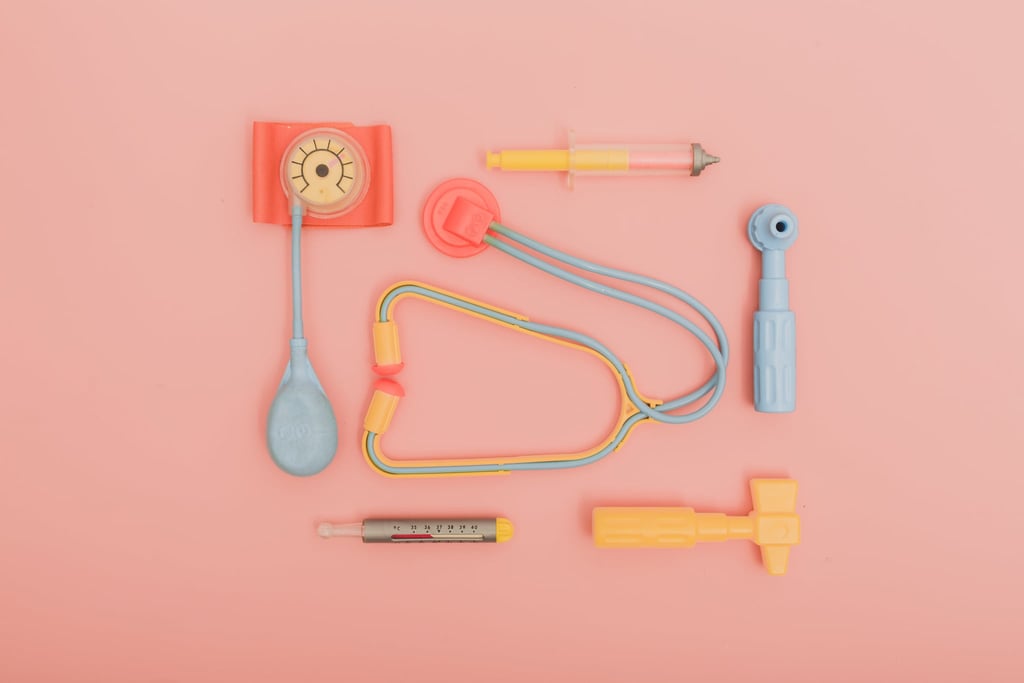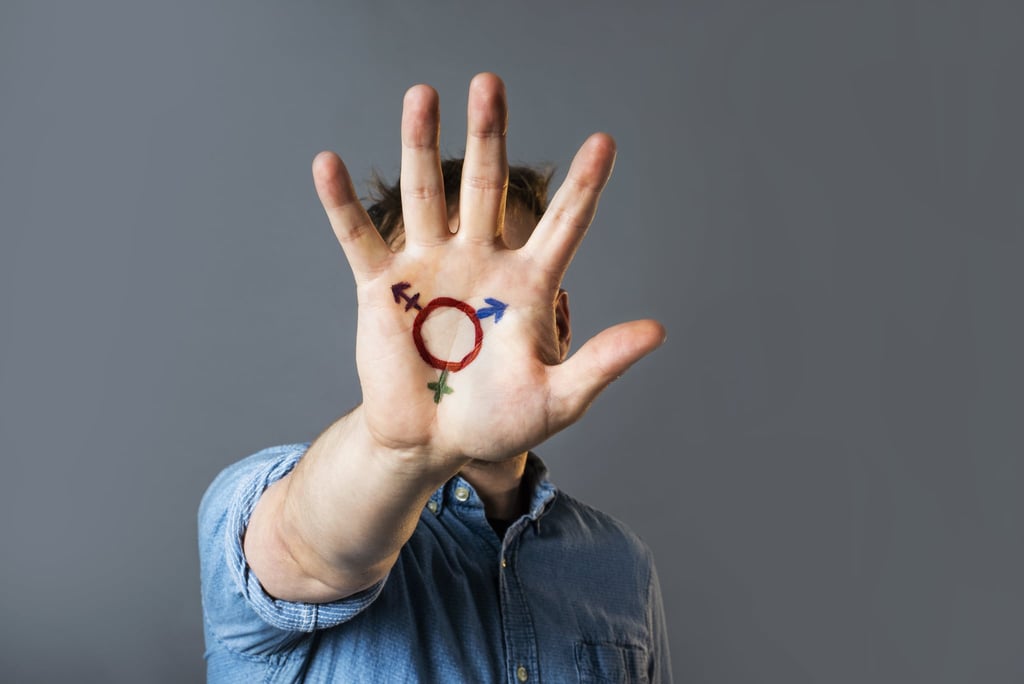When I first came out as a transgender man, my friends and family had a lot of questions. They were mostly genuinely curious, but admittedly ignorant — and unsure how to pose questions without coming across as transphobic or violating my privacy. Here, I've answered some of the most common questions I've received, in the hopes of shining some light on what it's like to be transgender. I also hope my guidance on questions that most trans people are happy to answer — and some that may be problematic — can do a bit of a public service.
"Isn't being trans just like being a butch lesbian?"
This is by far the question I've been asked the most, and it's also one of the most problematic.
Prior to coming out as trans, I identified as a lesbian, and I was the stereotypical Ellen Page type: flannel shirts, faded jeans, a shaggy haircut, and a pack of Marlboro Reds. To some folks, it didn't make sense that I would want to transition when I seemed "just fine" as a butch, same-sex-oriented woman. After all, I was already dressing and acting like a guy: Why would I want to "endure" the struggles associated with transitioning? Why would I willingly "suffer through" hormone therapy? Or go through multiple surgeries when it's "so easy" to just be a lesbian?
This line of questioning is insulting to many in the LGBTQ+ community. It assumes that an individual's gender identity and sexual orientation are one and the same and that a person should censor who they truly are to make the majority comfortable. "Being a butch lesbian is considered more acceptable than being trans — so why not just stick with that?": that's what is implied with this question. But there are trans guys who never identified as lesbians and there are lesbians who will never identify with being trans. Why? Because these are two different identities.
I didn't decide to just become trans because being a lesbian wasn't good enough for me; I've always been a man, but now I have the means to express that outwardly. I first heard the word "transgender" when I was in college, and everything clicked into place. My identity finally made sense, and a pathway opened up that allowed me to finally begin the physical transition so my physical body would match with my gender identity.
"Can't you just dress like a guy? Why do you need to physically transition?"
This is another one of those problematic questions that people ask when they think they're looking out for your safety and well-being. What this gets at is something called gender dysphoria [1], a very real condition that involves a conflict between your physical body/the sex you were assigned at birth and the gender with which you identify. There's a bit of controversy [2] within the trans community in regard to whether or not you need to experience gender dysphoria [3] in order to identify as trans, but, again, it really just depends on the individual.
Before I came out, I experienced gender dysphoria in public but didn't really have any issues at home. I didn't like people seeing that I had breasts or the barista at Starbucks referring to me as "ma'am," whereas at home, I knew that my wife would view and treat me as a man regardless of what my body looked like.
But dysphoria goes beyond dressing like a guy: feeling that disconnect between how you identify and what your body represents can be soul-crushing. Looking in the mirror and seeing breasts where you should be seeing pecs or trying to cover your wide hips with baggy t-shirts can wear you down. The need to physically transition is a major milestone in being trans, and it's typically a step many trans individuals celebrate. Yet, there are some folks (like Ryan Cassata [4]) who prefer not to take hormones but still identify as trans — and that is perfectly fine. There is no one way, no right or wrong path, to being trans.
"Will you be on hormones for the rest of your life?"
This really depends on the individual and their own health and wellness. Some trans or nonbinary folks may take hormone replacement therapy until they're satisfied with some of the nonreversible effects (facial hair growth, deepening of the voice, etc.) before stopping hormone treatment.
But for me? I will. I had a total hysterectomy last year and will continue to be on hormone therapy for the rest of my life, which is to be expected from a hysterectomy regardless of your gender identity.
"Is it OK to ask what pronouns you prefer?"
Absolutely! It may seem like an awkward question, but it's definitely preferred over being misgendered. If you're uncertain about what pronouns to use, just ask! This is one of the most welcome questions for any trans, genderqueer, nonbinary, or questioning person.
"Have you had or do you want that surgery?"
Do you often ask people about the equipment in their pants? Don't ask a trans guy whether or not he wants a penis, because that's just not something you ask anybody. What's in our pants isn't a topic of conversation.
"How do you have sex?"
How do you have sex? Once again, this is a question you wouldn't ask a stranger — or honestly, even most of your close friends, and certainly not your family members — so don't ask me.
"What's your real name?"
A trans person's "real" name is whatever name they give you.
The "real" name you're asking for is actually called a "dead name." That's the name given to a trans person at birth that we've since rejected. Hearing that name can be distressing and cause dysphoria. Not only does it likely misgender us, but by using it, you also refuse to recognise us for who we are.
Like pronouns, it's also rude as hell to not use someone's preferred name. My real name is Caleb. Call me Caleb.
"Do you ever regret transitioning?"
I got really offended the first time someone asked me this question because I thought they were trying to suggest that my existence and who I am was worth regretting, but that definitely wasn't the case. The reality is that this question is very complicated.
Physically transitioning is a lifelong experience with certain characteristics that can be irreversible. There are health risks associated with testosterone, complications that can arise from a hysterectomy or mastectomy, the mental and emotional roller coaster that comes with hormone replacement therapy: to transition is to put yourself through a lot.
Sometimes the permanence of my transition can be overwhelming, but I think about how much happier and more confident I am since I started my transition, and that puts my decisions into perspective. I've never worried that I've made the wrong decision and I've never regretted my transition, but there have been "oh sh*t" moments that come with going through a second puberty. Dealing with a cracking voice and acne in my mid-20s definitely wasn't fun — but do I regret transitioning? Absolutely not. When I took those first steps into the Los Angeles LGBT Centre and determined that I wanted to start testosterone in 2013, that was day one of starting something that I would keep up with for the rest of my life.
"How can I be a better ally for people who identify as transgender?"
Speak up, speak out, and educate yourself. We don't expect anyone to fight our battles for us, but it's always appreciated when an ally corrects someone's ignorance or speaks up when they hear transphobic speech.
While I have no problem providing these examples from my own life or answering these questions, sometimes the best thing you can do is educate yourself. If you've got a question, there are a ton of resources online that can provide you with more info, and you've taken that first step to become a better ally all on your own.
And, most of all, just treat us like you would treat anyone else. We're people, too.

